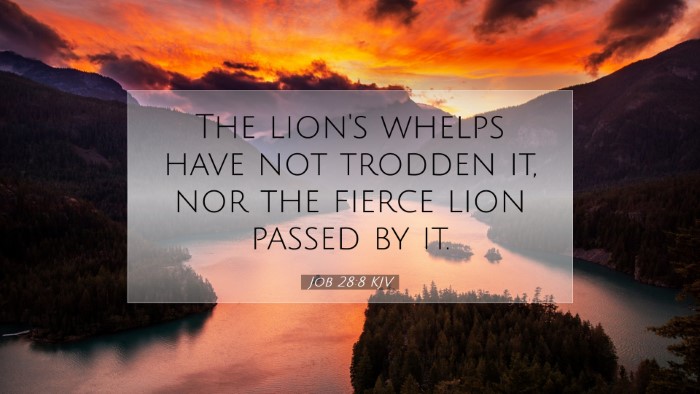Old Testament
Genesis Exodus Leviticus Numbers Deuteronomy Joshua Judges Ruth 1 Samuel 2 Samuel 1 Kings 2 Kings 1 Chronicles 2 Chronicles Ezra Nehemiah Esther Job Psalms Proverbs Ecclesiastes Song of Solomon Isaiah Jeremiah Lamentations Ezekiel Daniel Hosea Joel Amos Obadiah Jonah Micah Nahum Habakkuk Zephaniah Haggai Zechariah MalachiJob 28:8
Job 28:8 KJV
The lion's whelps have not trodden it, nor the fierce lion passed by it.
Job 28:8 Bible Commentary
Commentary on Job 28:8
Job 28:8 states, “The proud beasts have not walked there; nor has the fierce lion passed by it.” This verse is part of a larger discourse on wisdom, its elusiveness, and the intrinsic value of understanding. The metaphorical language employed by Job conveys profound truths about the nature of wisdom and the world beyond human discovery.
Contextual Background
The Book of Job delves deeply into the problem of suffering and the search for understanding in the face of inexplicable misfortune. Job, a figure characterized by righteousness and wealth, experiences unimaginable suffering. In this context, Job embarks on a poetic exploration of wisdom, envisioning it as something highly sought after yet not easily attainable. Job 28 serves as a hymn to wisdom, carefully delineating its qualities and the lengths to which humanity must go to grasp it.
Insights from Commentators
-
Matthew Henry:
Matthew Henry emphasizes that Job 28 reflects upon the depths of the earth, where precious resources are found, yet wisdom remains elusive. He contrasts the physical pursuits of mankind with the spiritual quest for wisdom. Naked beasts, which represent the primal and untamed aspects of creation, have not traversed the paths leading to wisdom. For Henry, this line reflects the idea that wisdom is not governed by brute strength or pride, but is hidden from the eyes of the worldly and those who seek dominion through might.
-
Albert Barnes:
Barnes interprets this verse as highlighting the sacred and transcendent nature of wisdom. The fierce lion symbolizes human pride and ambition, which are incapable of grasping the true essence of wisdom. He notes that wisdom is more precious than any earthly gain and that where wisdom resides is a place untouched by the evil of the world. This indicates that wisdom’s path is exclusive to those who seek it humbly and sincerely.
-
Adam Clarke:
Clarke provides insights into the metaphor of the lions and beasts, interpreting them as symbols of strength and ferocity. He stresses that the “proud beasts” represent mankind's attempts to seize power and wisdom through their own devices. The verse indicates that such attempts are futile, as genuine wisdom is beyond the grasp of those who rely solely on human capabilities or pride. Clarke points out that a deeper understanding of wisdom lies in humility and reverence for God.
Theological Implications
The theological implications of Job 28:8 call into question the nature of true wisdom. Many theological scholars assert that wisdom is not merely a collection of knowledge or the ability to apply understanding; it embodies a relationship with God. The absence of beasts in this place signifies that wisdom cannot be cultivated through earthly means or animalistic instincts. Rather, it is through divine revelation and humility before God that one may hope to access true wisdom.
Practical Applications
For pastors, students, and theologians, Job 28:8 serves as a reminder of the need for humility in the pursuit of wisdom. In a culture that often equates knowledge with power, this verse challenges believers to recognize that spiritual insight comes from a place of reverence. The call to turn away from pride and self-sufficiency appears prominently in both personal and communal encouragement to pursue wisdom.
- Humility: Recognizing the limits of human understanding fosters a deeper reliance on God’s wisdom.
- Spiritual Pursuit: Daily engagement in prayer and scripture can develop a heart that seeks divine wisdom.
- Community: Engaging with other believers for corporate wisdom-seeking enriches understanding and applications of this truth.
Culmination of Thought
Overall, Job 28:8 encapsulates a critical perspective on the nature of wisdom, inviting us to reconsider sources of knowledge and understanding. Job’s poetic declaration serves as a stark reminder of the contrast between earthly pursuit and divine insight. As we reflect on this passage, let us aspire to seek wisdom in a way that transcends human ambition, recognizing that our ultimate understanding lies in the hands of the Creator.


